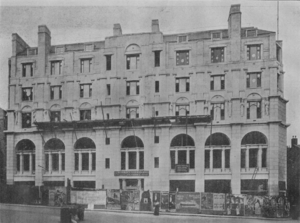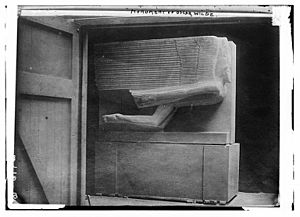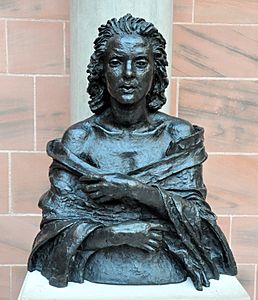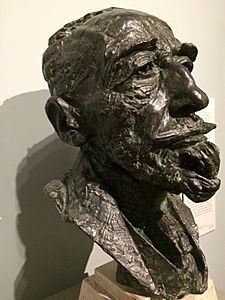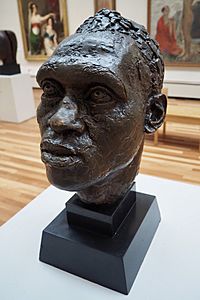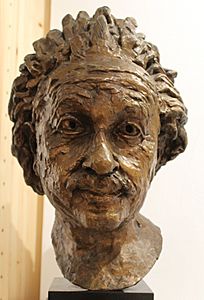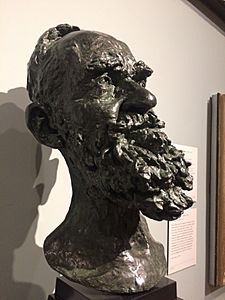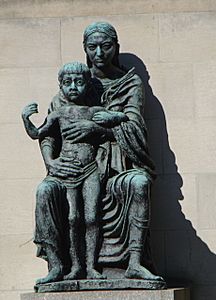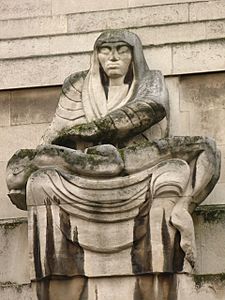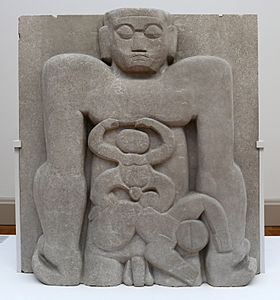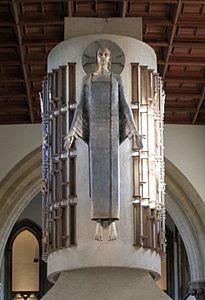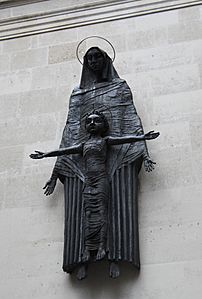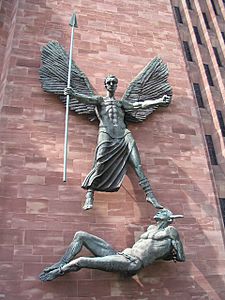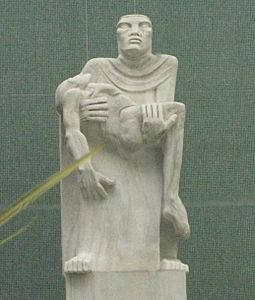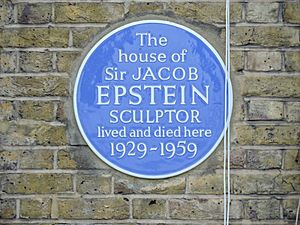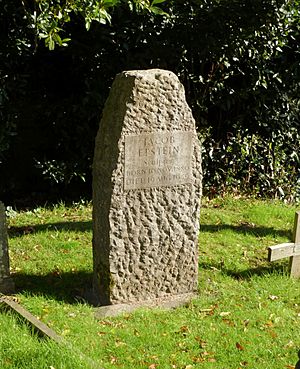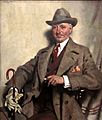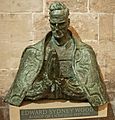Jacob Epstein facts for kids
Quick facts for kids
Jacob Epstein
|
|
|---|---|
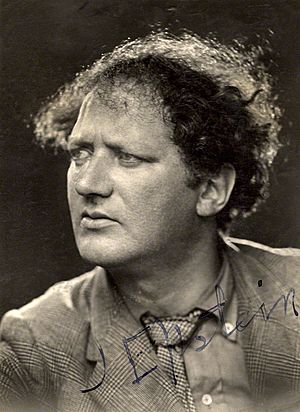
Jacob Epstein, photographed in 1921 by George Charles Beresford
|
|
| Born | 10 November 1880 New York City, U.S.
|
| Died | 21 August 1959 (aged 78) Hyde Park Gate, London, England
|
| Nationality | British / United States |
| Alma mater |
|
| Known for | Sculpture |
| Spouse(s) |
|
Sir Jacob Epstein (born November 10, 1880 – died August 21, 1959) was an American-British sculptor. He was a very important artist who helped start modern sculpture. He was born in the United States. In 1902, he moved to Europe. He became a British citizen in 1910.
Contents
Early Life and Art Training
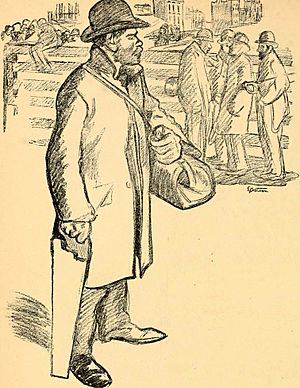
Jacob Epstein was born in New York City. His parents were Max and Mary Epstein. They were from Poland and followed the Jewish faith. Jacob was one of eight children in a middle-class family.
When he was a child, Jacob had a lung illness called pleurisy. He left school at age thirteen. From 1893 to 1898, he took art classes. He studied at the Art Students League of New York.
In 1898, he helped organize an art show for Jewish artists. In 1899, he chose to stay in his old neighborhood. He worked to support himself. He also started selling his drawings. He made pictures for a book called The Spirit of the Ghetto.
In 1900, his home burned down. He lost all his drawings and became homeless. He then worked on a farm for a while. In 1901, he worked in a metal foundry. He also took more art classes. The money from the book illustrations helped him. He used it to move to Paris in September 1902.
In Paris, Epstein studied at famous art schools. He learned at the École des Beaux-Arts and the Académie Julian. He also visited many museums. He loved looking at sculptures from different cultures. He studied art from India, China, Africa, and Polynesia. These artworks greatly influenced his own sculptures later on.
Sculpture Career
From 1907 to 1908, Epstein made eighteen large sculptures. These were for a new building in London. It was for the British Medical Association. He made models first. Then, other carvers copied them in stone. Epstein then added the final touches. He soon decided he preferred to carve stone himself.
His sculptures for this building were new and different. They used ideas from ancient Indian art. The female figures looked like Buddhist and Hindu statues.
The Tomb of Oscar Wilde
In 1908, Epstein was chosen to create a tomb for the writer Oscar Wilde. The tomb was to be in a cemetery in Paris. Epstein first designed a statue of Narcissus. But he changed his mind. He destroyed that design.
His new design was carved directly into stone. It was a huge winged figure. It looked like ancient Assyrian sculptures. Epstein said it showed "a vast, winged figure... the idea of a poet as a messenger." Smaller figures represented Fame and other ideas. In 1912, the completed tomb was shown in London. People liked it a lot.
A rich American art collector named John Quinn became Epstein's main supporter. Quinn bought many of Epstein's artworks. After Quinn died, some of these sculptures went to public museums in the United States.
Artworks in the 1930s
In the 1930s, Epstein did not get many big public projects. So, he worked on large sculptures about religious topics. He also made money by creating portrait busts. These were sculptures of people's heads and shoulders. He also sold paintings of flowers and landscapes.
In 1929, Epstein carved a huge marble sculpture called Genesis. It was a pregnant woman with a swollen belly. Her face looked like an African mask. When it was shown in 1930, some people did not like it.
In 1933, Epstein spent time painting landscapes. He painted over a hundred pictures in two months. These paintings became popular yearly shows. Also in 1933, the famous scientist Albert Einstein posed for Epstein. Einstein spent seven days with the sculptor. Epstein said Einstein's look was "humane, humorous and profound."
Epstein's bronze portrait sculptures were very well known. They often had rough surfaces. He carefully shaped the small details of faces.
His larger sculptures were more experimental. They showed a lot of emotion.
Later Years
After World War II, people started to appreciate Epstein's art more. He was almost seventy. He began a very busy time in his art career. In 1950, he received his first public sculpture job in twenty years. It was for a statue called Youth Advancing.
In 1952, his sculpture Lazarus was placed in a chapel in Oxford.
In 1947, a convent wanted a sculpture of the Madonna and Child. The architect, Louis Osman, wanted Epstein to make it. Epstein made a small model. The convent thought it was too expensive. But Epstein and Osman, with help from others, agreed to pay for it. Epstein also changed the Madonna's face to please the convent. The sculpture was unveiled in 1953. It was praised by almost everyone.
While working on Madonna and Child, Epstein took on other big projects. He traveled to the United States for a large sculpture group. It was called Social Consciousness. In London, the Tate museum held a big show of his work. It had many sculptures and drawings.
Final Works
The success of the Madonna and Child in 1953 led to more public art jobs. He received commissions for Llandaff Cathedral and a statue of Field Marshall Jan Smuts. Epstein took on so much work that he got a very large studio. There, he worked on Social Consciousness and Christ in Majesty. The cathedral had wanted the Christ in Majesty figure in plaster. But Epstein offered to pay for it to be cast in metal. It was unveiled in 1957.
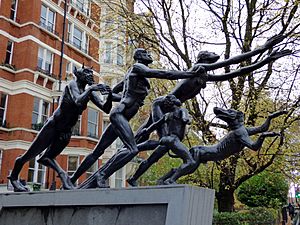
Epstein was given a special honor in 1954. He became a Knight Commander of the Order of the British Empire. This meant he could be called "Sir Jacob Epstein."
In 1955, he was asked to make a sculpture for the new Coventry Cathedral. It was a giant sculpture of St Michael's Victory over the Devil. He also got a job to make a war memorial. The next year, Westminster Abbey asked for a memorial to William Blake.
Epstein started making the large Coventry Cathedral sculpture even before it was fully approved. He said he would do it for himself. When church officials saw the work, they were very impressed. They quickly approved the project. In 1956, Epstein wrote that he was getting many requests for large works. He worried he might not finish them all.
In 1958, Epstein was too sick to attend the unveiling of the war memorial. He was in the hospital. After getting better, he continued working. He made a portrait of Princess Margaret. He also started work on the large Bowater House Group sculpture. Epstein finished this sculpture on the day he died in August 1959.
Personal Life
Jacob Epstein was married to Margaret Dunlop. They lived together until she died in 1947. However, he also had relationships with other women. He had five children: Peggy Jean, Theo, Kathleen (Kitty), Esther, and Jackie.
After Margaret died, he married Kathleen Garman in 1955. Their daughter, Kitty, married the painter Lucian Freud. They had two daughters. Kitty and Lucian Freud later divorced.
Death and Legacy
Jacob Epstein died in August 1959 at his home in London. He was buried in Putney Vale Cemetery.
Epstein's art can be found all over the world. His work was very original for his time. He greatly influenced younger sculptors. These included famous artists like Henry Moore and Barbara Hepworth. They were all fascinated by non-European art, just like Epstein.
Selected Major Artworks
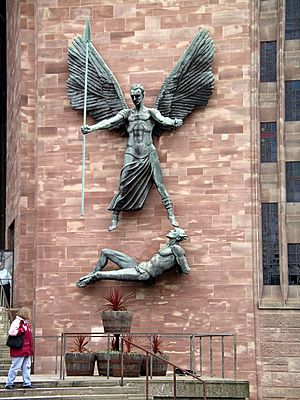
- 1907–08 Ages of Man, British Medical Association headquarters, London
- 1911–12 Oscar Wilde's tomb – Père Lachaise Cemetery, Paris
- 1913–14 Rock Drill, bronze — Tate Collection
- 1917 Venus marble – Yale University Art Gallery, New Haven, Connecticut
- 1919 Christ Bronze – Wheathampstead, England
- 1924–25 W. H. Hudson Memorial, Rima, Hyde Park, London
- 1927 Madonna and Child, bronze, Riverside Church, New York City
- 1928–29 Night and Day Portland Stone – 55 Broadway, London
- 1933 Head of Albert Einstein Bronze – many copies exist
- 1939 Adam Alabaster – Harewood House, near Leeds
- 1940–41 Jacob and the Angel Alabaster - Tate Britain
- 1944– 45 Lucifer - Bronze - Birmingham Museum and Art Gallery
- 1947–48 Lazarus Hoptonwood Stone – Chapel of New College, Oxford
- 1950 Madonna and Child Lead, Convent of the Holy Child Jesus, London
- 1954 Social Consciousness – University of Pennsylvania, Philadelphia
- 1954–55 Christ in Majesty – 5.5m aluminum figure – Llandaff Cathedral, Cardiff
- 1956 Liverpool Resurgent – Lewis's Building, Liverpool
- 1956 Statue of Field Marshall, Jan Smuts - Bronze - Parliament Square. London
- 1957 Bust of William Blake, Westminster Abbey, London
- 1958 Trade Union Victims of Two World Wars - The Spirit of Trade Unionism - Stone - Congress House, London
- 1958 St Michael's Victory over the Devil Bronze – Coventry Cathedral
- 1959 The Rush of Green (also known as Pan or The Bowater House Group), Hyde Park, London
Images for kids
-
Jacob Epstein, by William Orpen, 1927
-
Oscar Wilde's tomb, 1912, Père Lachaise Cemetery, Paris
-
The Visitation, 1926, Queensland Art Gallery
-
The Archangel Lucifer, 1944–45, Birmingham Museum and Art Gallery
-
Edward Sydney Woods, 1958, Lichfield Cathedral
See also
 In Spanish: Jacob Epstein para niños
In Spanish: Jacob Epstein para niños


